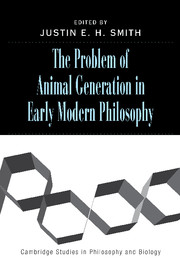Book contents
- Frontmatter
- Contents
- List of Contributors
- Introduction
- I THE DAWNING OF A NEW ERA
- II THE CARTESIAN PROGRAM
- III THE GASSENDIAN ALTERNATIVE
- IV SECOND-WAVE MECHANISM AND THE RETURN OF ANIMAL SOULS, 1650–1700
- V BETWEEN EPIGENESIS AND PREEXISTENCE: THE DEBATE INTENSIFIES, 1700–1770
- 11 Explanation and Demonstration in the Haller-Wolff Debate
- 12 Soul Power: Georg Ernst Stahl and the Debate on Generation
- 13 Charles Bonnet's Neo-Leibnizian Theory of Organic Bodies
- VI KANT AND HIS CONTEMPORARIES ON DEVELOPMENT AND THE PROBLEM OF ORGANIZED MATTER
- VII KANT AND THE BEGINNINGS OF EVOLUTION
- Bibliography
- Index
12 - Soul Power: Georg Ernst Stahl and the Debate on Generation
Published online by Cambridge University Press: 06 August 2009
- Frontmatter
- Contents
- List of Contributors
- Introduction
- I THE DAWNING OF A NEW ERA
- II THE CARTESIAN PROGRAM
- III THE GASSENDIAN ALTERNATIVE
- IV SECOND-WAVE MECHANISM AND THE RETURN OF ANIMAL SOULS, 1650–1700
- V BETWEEN EPIGENESIS AND PREEXISTENCE: THE DEBATE INTENSIFIES, 1700–1770
- 11 Explanation and Demonstration in the Haller-Wolff Debate
- 12 Soul Power: Georg Ernst Stahl and the Debate on Generation
- 13 Charles Bonnet's Neo-Leibnizian Theory of Organic Bodies
- VI KANT AND HIS CONTEMPORARIES ON DEVELOPMENT AND THE PROBLEM OF ORGANIZED MATTER
- VII KANT AND THE BEGINNINGS OF EVOLUTION
- Bibliography
- Index
Summary
PREMISES FOR A PHANTOM EMBRYOLOGY
Before beginning the analysis, it should be specified that it offers hardly any advantage for strictly medical purposes, except for a series of connections, which, being more useful in terms of our present disquisition, we shall describe, avoiding any excessive prolixity.
Questions connected to generation are on the whole extraneous to the genuine study of medicine. They should therefore be dealt with summarily, and only because of their repercussions in prevention or cure. Such is Georg Ernst Stahl's firm belief. If, however, the author of Theoria medica vera really did attribute such a limited importance to the question, why, in the first decade of the eighteenth century did a debate emerge on the explanatory validity and meaning of Stahl's embryology? What were the various significations imputed to the dictum of the “Beacon of Halle University”? This essay is an attempt to reconstruct Stahl's position with regard to the problems of generation and trace the history of its interpretation in the first phase of the debate, from 1708 (the year of the publication of Theoria medica vera) to 1734 (the year of Stahl's death).
Stahl believed that the medical discipline should exclude anything that did not help the physician attain his immediate professional goal: keeping people healthy or helping them regain their health. This is why, though a chemist of some note, he considered almost every notion provided by chemistry or anatomy as superfluous to medicine.
- Type
- Chapter
- Information
- The Problem of Animal Generation in Early Modern Philosophy , pp. 262 - 284Publisher: Cambridge University PressPrint publication year: 2006
- 3
- Cited by



